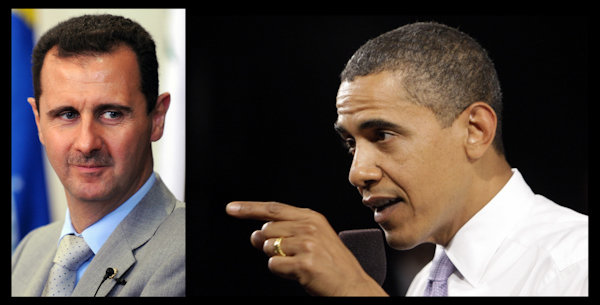Photo by: Henoc Kivuye
Diplomatic developments may forgo U.S. military strikes on Syria; however, President Barack Obama said he wants to intervene.
“I determined that it is in the national security interests of the United States to respond to the Assad regime’s use of chemical weapons through a targeted military strike,” Obama said in his nationally televised speech Tuesday.
For the past few weeks the eyes of the political arena were focused on Syria, where possible U.S. action ruffled the feathers of the international community. Russia denounced any U.S. involvement in Syria, but a recent diplomatic solution may be developing.
Russia has worked out a deal with Syria to release its arsenal of chemical weapons into international control in hopes of thwarting U.S. aggression. As of Thursday Sept. 12 Syria was legally accepted into the Chemical Weapons Convention an arms control agreement outlawing the production, stockpiling, and use of chemical weapons. The process of overturning the weapons they have now is ongoing.
“It’s too early to tell whether this offer will succeed, and any agreement must verify that the Assad regime keeps its commitments,” Obama said. “But this initiative has the potential to remove the threat of chemical weapons without the use of force, particularly because Russia is one of Assad’s strongest allies.”
Obama asked Congress to postpone a vote to authorize the use of force while this diplomatic path is pursued.
Syria has been engaged in civil war since April 2011. The war has caused the deaths of more than 100,000 people and created 2 million refugees, but a chemical weapon attack on civilians has caught the world’s attention.
U.S. officials said President Bashar al-Assad, the Syrian government leader, sanctioned a chemical weapon attack that killed more than 1,400 people, including at least 400 children in the Damascus suburbs on Aug. 21, 2012.
Other casualty estimates differ, and Assad has said the rebels fighting to drive out his regime are responsible for the attack.
“Ultimately, this is a sticky situation politically and ethically,” Christian Asbill, a senior Oklahoma Christina University political science major, said. “What the chemical weapons represent is an inhumane and an internationally denounced means of waging warfare.”
Although President Obama’s administration is adamant for U.S. military intervention, public support is lacking. Debates over the proper international course of action are raging.
“What should our response be?” Asbill said. “There’s a consensus on what’s been done is wrong, the disagreement is on how to approach it.”
Jamil al-Botros is a freshman Oklahoma Christian student from Damascus, Syria. With his family still in Syria, Botros came to Oklahoma, in part, to escape the conflict. He is against the U.S. intervening in his home country.
“It’s a civil war and it should stay inside one country instead of spreading it out,” Botros said. “A lot of things are at stake, especially with this kind of issue.”
Congress and Obama have stated that if the U.S. did intervene, no boots would be on the ground in Syria. Strikes by cruise missiles from U.S. naval vessels in the region would be the likely option.
“The purpose of this strike would be to deter Assad from using chemical weapons, to degrade his regime’s ability to use them, and to make clear to the world that we will not tolerate their use,” Obama said in his speech.
Botros doesn’t see the action as a viable option.
“They’re just going to launch missiles for 60 days then go back – which is not going to do anything,” Botros said. “It’s going to kill a few people and that’s it.”
Obama said the U.S. strikes would send a message that no other nation can deliver.
“I don’t think we should remove another dictator with force – we learned from Iraq that doing so makes us responsible for all that comes next,” Obama said. “But a targeted strike can make Assad, or any other dictator, think twice before using chemical weapons.”
If Assad is responsible for the chemical weapon attacks against civilians, Asbill said, then there is a need for repercussions. Internationally, however, there is confusion and disagreement.
Asbill does not think the U.S. should get involved.
“Syria does not represent any threat to American national security at this time,” Asbill said. “We have no interests that are being explicitly threatened by the conflict in Syria. It’s an internal dispute.”
Although the conflict in Syria is currently contained within the country, refugees are fleeing to outside countries.
Afton Paris, a senior political science major, sees more international problems arising if the U.S. gets involved.
“I would definitely think the U.S. should not intervene and should just stay out of it,” Paris said. “It’s a local conflict. We might be causing an even bigger problem by intervening.”
International tensions are high and rising, she said.
“If the U.S. were to intervene militarily, it could very well spark a third world war and set off a whole chain of events in international relations that are definitely undesirable,” Paris said.
Asbill agreed to a lesser extent.
“This has the potential if it gets out of hand to spiral into a much larger conflict if not regional than possibly on a more global scale,” Asbill said. “Comments that this could ignite World War III at this stage are extreme, but I would not say they’re unfounded.”
Paris recommends being informed on the issue.
“Read up on the news stories that have been covering Syria for the last few years,” Paris said. “Call the office of your congressman or representative to either voice your opinion or to see what your congressman’s platform actually is.”
Asbill thinks the international political war over Syria will be decided soon.
“Over the next few weeks this will play out more fully,” Asbill said. “I would say that probably by the end of next week we will know if military action is going to take place and to what scope. We’ll just have to wait and see.”
Although Botros is worried about the safety of his family, he thinks the war can be solved within his own country without foreign intervention.
“A lot of people don’t think their voice matters in this situation,” Botros said. “Make yourself heard. Nothing good comes out of wars.”













Be First to Comment